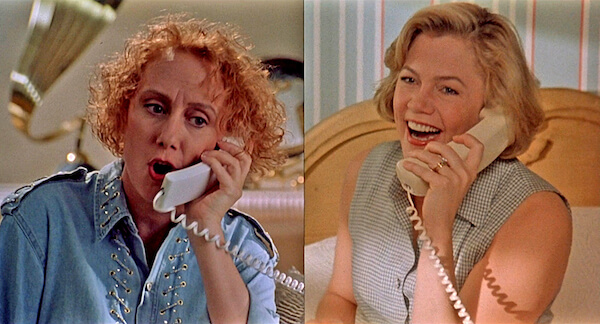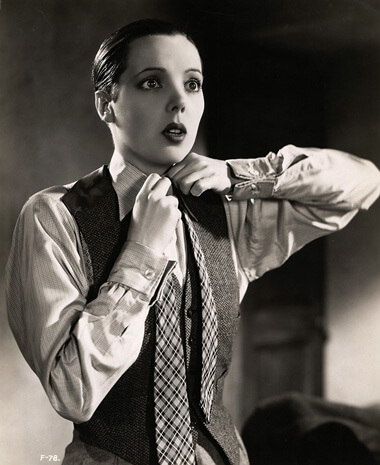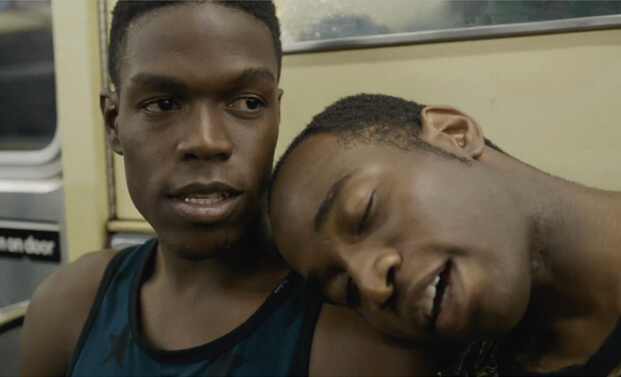Rob Epstein and Jeffrey Friedman, directors of “Lovelace,” which opens August 9. | RADIUS TWC
Gay filmmakers Rob Epstein and Jeffrey Friedman’s compelling biopic “Lovelace” is as much about the adult film actress Linda Lovelace’s (Amanda Seyfried) abuse at the hands of her husband, Chuck Traynor (Peter Sarsgaard), as it is about her meteoric rise to fame. The film chronicles teenage Linda being seduced by Traynor, a Svengali who teaches her how to perform the oral sex act that becomes her claim to fame. After chronicling how she made the wildly successful “Deep Throat,” the filmmakers shift gears and retell Linda’s story from her perspective, revealing the impact of her husband’s mental and physical cruelty.
“Lovelace” makes Linda a sympathetic victim, and Seyfried captures the title character’s fragility well. Sarsgaard effectively capture the mixture of charm and menace in Chuck’s personality, and Sharon Stone gives a terrific performance as Linda’s stern mother.
Gay filmmakers look at celebrity whose private life was often hard to swallow
In a recent phone interview, Epstein and Friedman spoke with Gay City News about making “Lovelace.”
GARY M. KRAMER: What intrigued or surprised you about Linda’s story?
JEFFREY FRIEDMAN: I think it was her pivotal place in the history of our sexual culture that intrigued me the most. She’s the Zelig of the 1960s and 1970s — from the birth of the porn explosion to the beginnings of feminism. I was vaguely aware that she was alienated from the porn industry, but I didn’t know the details, so all the details of her story were surprising to me.
The other thing that interested me in that regard is that the way I came to know who she was — or who I think she was — changed radically over the years. My first impression of her was a public presentation that I naïvely accepted at face value. But there is that great gap between how we receive media and news about people and the reality of those people — that whole dynamic interested me.
GMK: Many of your films, both fiction and documentary, address social, cultural, and political attitudes toward sex and sexuality. What is your interest in sex?
JF: Who isn’t interested in sex?! Sexuality has a special place in the gay story, and it very viscerally made the private public. So maybe that’s part of it. Sex tells us so much about who we are, and the way we deal with sex is how we are in the world.
GMK: When did you first see “Deep Throat,” and what was your reaction to it?
JF: When I started working on this movie.
GMK: Did you like it?
JF: No, it’s terrible! The worst movie! In some ways it’s kind of wonderful in a 1960s Warhol way. The opening sequence is a five-minute sequence of her driving and nothing happens. The humor is kind of burlesque humor, which is odd to see in a porn film. The actual blowjobs are just blowjobs. They are impressive. But as a cultural phenomenon I find it fascinating… delightfully weird.
ROB EPSTEIN: I saw it in college in a midnight show, which I swear was a double feature with “Pink Flamingos.” But John Waters said that was not possible. I remember thinking “Deep Throat” was like a cartoon. Not so much a porn film, but a trashy campy film like “Pink Flamingos,” which is a much better film.
GMK: What is the appeal of Linda’s story to you as gay men?
RE: Several things. We were interested in the character of Linda Lovelace — who was born Linda Boreman — who had to do her own kind of coming out. First, as a sexual being — a reaction to her oppressive family background. Then as an international porn star. And then, the whole other iteration of her life when she denounced her past.
As gay men, we can understand her soul-searching, even though it’s a different experience. We were fascinated by that, and all the issues around the sexual revolution and what she embodied. People think the sex revolution benefited everyone, but originally it was straight men, then women, then gay men. Also, as filmmakers, one commonality we’re attracted to is art on the fringes that makes its way into the mainstream.
GMK: Can you discuss why your films are very much about the personal being political?
JF: I can’t say it’s a conscious decision. Those are the stories that we find inspiring, and are interested in — people who set out to make a difference and really do change the world.
GMK: Why did you approach Linda’s story as both a public and a private version?
RE: We’re used to constructing stories and reconstructing stories. So much of our documentaries are made in editing. When we were first immersing ourselves in the story to figure out an approach, the question was, “Who is the real Linda Lovelace/ Boreman?” She had a complicated, layered life. We wanted to tell the story that mirrored her psychology that looks back on her life through a different lens — how she presented to the world and then told it a few years later.
GMK: Why did you decide to recreate the porno scenes rather than use clips?
RE: We wanted to do our own take on the film, so we did all of our own recreations rather than use any of the [original] film. We had a great time with that.
JF: It was more fun to recreate it. You couldn’t have all the stuff behind the camera if you were using the real footage.
GMK: You present surprisingly little nudity and sex on screen. Was that deliberate?
JF: It was never our goal to show as much sex as possible. But when the story calls for it, we tried to make it sexy. There’s some real intimacy. There’s nothing shocking in what we show. It’s a story of a woman’s sexuality as it evolves, so we wanted to show Linda becoming free in her body and claiming her body.
GMK: What can you say about exploring the line between passion and pain?
RE: Whoa! That’s deep!
GMK: Well, it is “Deep Throat!”
RE: [Laughs.] That has a lot to do with what defines us and how empathetic we are to other people’s experience. How we relate to sexuality defines who we are. Empathy or lack of it is expressed through sex.
GMK: Linda comes across as very naïve, then very sympathetic. Why did you present her character in this way?
RE: She was very young in that relationship with Chuck. By the nature of those kinds of relationships where there’s passion and pain and you’re as young as she is, I imagine that it was difficult for her to get out of that cycle.
GMK: So do you see “Lovelace” as a cautionary tale?
JF: I hope people look at public stories of real people more skeptically or think about them more critically. Or be inspired by her story, a woman overcoming adversity.
RE: We thought of Linda as the first reality superstar. She was an average working-class girl who suddenly became internationally famous. There are advantages and disadvantages to being in that spotlight. She was of a different time and era and spent the rest of her life having to overcome it.
LOVELACE | Directed by Rob Epstein and Jeffrey Friedman | Radius TWC | Opens Aug. 9 | Angelika Film Center, 18 W. Houston St. at Mercer St. | angelikafilmcenter.com | Elinor Bunin Munroe Film Center, Lincoln Center, 144 W. 65th St. | filmlinc.com | AMC Empire 25, 234 W. 42nd St. | amctheatres.com



































